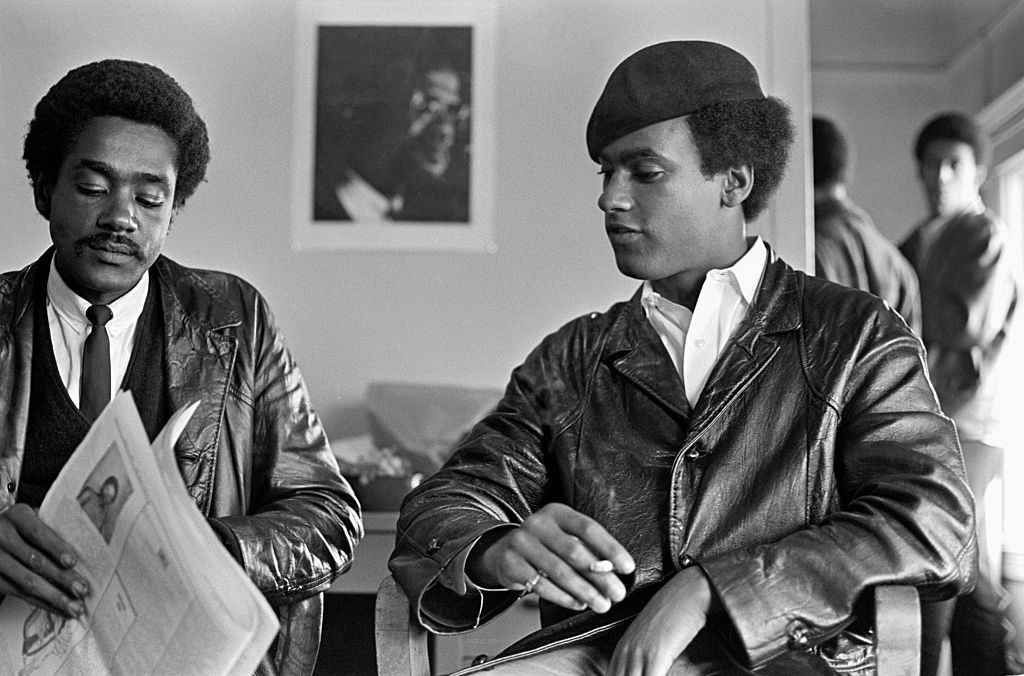-
 play_arrow
play_arrow
Foxy 106.9
-
 play_arrow
play_arrow
Dr. Candice Carter-Oliver Interview
Huey Newton And Bobby Seale Founded The Black Panther Party On This Day In 1966

Huey Newton (right) is shown sitting with Bobby Seale at Back Panther Party headquarters in San Francisco. | Source: Ted Streshinsky Photographic Archive / Getty
UPDATED: 9:00 a.m. ET, Oct. 15, 2024
As one of the most storied African American groups during the turbulent late 1960s, the Black Panther Party For Self Defense (more commonly known as the Black Panther Party) stood out not only for its militant appearance but also for its work in impoverished neighborhoods. As students at Oakland’s Merritt College (formerly Oakland City College), Huey Newton and Bobby Seale were inspired by the teachings of Malcolm X, who was slain just a year before they began the Party. Newton and Seale, growing tired of police brutality and other forms of injustice against Black Americans, formed the Black Panther Party on this day, October 15, in 1966.
Fashioning themselves as left-wing revolutionaries, the Black Panthers felt that Blacks in America needed protection against police, underscoring their emphasis on self-defense. Since Newton was a reader of Karl Marx, Frantz Fanon, Vladimir Lenin, and other revolutionary figures, the Black Panthers taught socialist and Marxist ideology to its members.
MORE: Remembering The Politics Of Fred Hampton’s Assassination By Chicago Police
Newton maintained the title of defense minister while Seale was recognized as the group’s chairman. Along with forming the party, the group’s landmark “Ten Point Program” was also introduced after being inspired by Stokely Carmichael (aka Kwame Toure) and his activism in Alabama.
Demonstrators rally outside the Alameda County Courthouse in Oakland, Calif. during the Huey Newton murder trial on July 17, 1968. | Source: San Francisco Chronicle/Hearst Newspapers via Getty Images / Getty
The Party’s platform called for equal rights for Blacks, a call for jobs for the community, housing, education, and other demands. Party members were also famous for being armed publicly, after Newton learned that a loophole in California law allowed them to bear guns in plain sight as long as they weren’t aimed.
The Panthers claimed Oakland as a “territory” with the police being enemies of their land and acted as both a community support system and militia-like force.
With racial tensions rising, so did the Panther’s activity. After first denying his involvement, Newton admitted to the killing of Officer John Frey, which galvanized the Panthers even further. H. Rap Brown (now serving life in prison for the 2000 killing of Georgia officer Ricky Kinchen) and James Forman used the moment to stage a huge “Free Huey” rally months later, calling for violence and the assassination of public officials if their leader was not set free. Newton fled trial and escaped to Cuba but still led the Panthers as much as he could from afar.
A woman sits on a bench outside the Black Panther office in Harlem circa 1970 in New York City, NY. | Source: Michael Ochs Archives / Getty
Beyond their many conflicts with law enforcement officials, the Panthers’ “survival programs” were the stuff of legend. The group provided free food, self-defense training, tutoring, first aid, clothing, drug and alcohol rehab, and many more social programs for those in need. This would land the Party on the radar of the FBI and the insidious “COINTELPRO” program, which then-director J. Edgar Hoover enacted to halt the growth of the group. The FBI infiltrated the inner workings of the Panthers and pitted other similar groups against them, according to documents and personal accounts regarding the matter.
The Black Panther Party dealt with criticism of its violent nature, which often overshadowed the group’s good works. Some members wanted a focus on the socialist aspect, while others wanted to be even more confrontational. The decline of the party was readily apparent in the 1970s, especially in 1974 when Newton appointed Elaine Brown as the Party’s first chairwoman.
Watch a brief video showing the history of the Black Panther Party:
The group became more involved in the electoral process from this point on, and more women increased their visibility and involvement as a result. Brown, however, would leave the party after Newton ordered the beating of a female Panther member.
The official end of the party was marked by the closing of its sponsored school in 1982 after Newton was discovered embezzling funds from the school to fuel his drug addiction needs. Newton was later fatally wounded by a gunshot in 1989 at the age of 47 by a rival Black nationalist group member and drug dealer.
The Black Panther Party’s legacy lives on, and while a new version of the group has been erected, they have not enjoyed the same success as their predecessors. Some Panthers have gone on to great careers since their involvement, such as Congressman Bobby Rush; singer Chaka Khan; and father to superstar rapper Kanye West, psychologist Ray West.
No matter what stories have been told about the Black Panther Party, the group’s legendary ascent and unfortunate demise still stands as an important piece in our history.
SEE ALSO:
Mutual Aid Fund Provides Financial Support To Former Black Panther Party Members

-
4942 Delmar Blvd.
St. Louis, MO. 63108
CONTACT US
- 314-782-FOXY (3699) OFC
- 314-944-1069 REQUEST LINE
- [email protected]
- ADVERTISING INQUIRIES
- [email protected]
FOXY QR CODE


